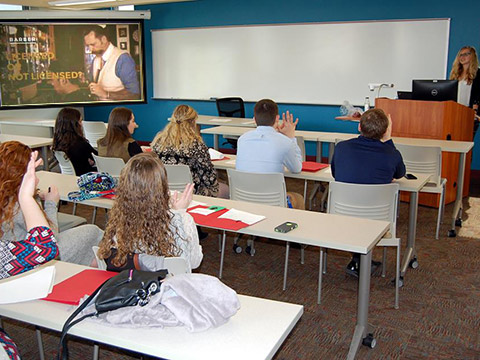The vision of the Knee Center is to unlock the potential and improve the quality of life of all citizens.
Our mission is to produce high-quality research on the effects of government regulation and to communicate the results broadly to inform real world change.
We currently have three focus areas: certificate of need, occupational licensing, and scope of practice.
View DatabaseFind LegislatorsContact KRRC
How We Started
Established in June 2016, by founding Director and Professor of Economics, Dr. Edward Timmons at Saint Francis University, The Knee Center is an academic research center funded by a generous grant from The Knee Family Foundation and the Charles Koch Foundation.
The Knee Center was housed the Shields School of Business, the Charles M. Schwab Hall, at St. Francis University in Loretto, PA until 2021.
Where We are Now
In the fall of 2021, the Knee Center moved to West Virginia University’s John Chambers College of Business and Economics in Morgantown, WV. The College offers ten bachelor's, ten master's, and two doctoral degrees. With an undergraduate enrollment of approximately 1,500, the College has more than 20,000 alumni worldwide. Business programs at the WVU John Chambers College of Business and Economics are accredited by AACSB International - The Association to Advance Collegiate Schools of Business. In its 2011 edition, Bloomberg Businessweek ranks West Virginia University’s John Chambers College of Business and Economics among the top 100 undergraduate business schools in the country.
- Creation of a national database.
- Raise awareness and encourage discussion.
- Organize educational panels at conferences.
- Encourage research.
- Prepare reports for policy makers, academics and citizens.
Dr. Edward Timmons
Dr. Edward Timmons has dedicated his academic career to the study of occupational licensing.
In addition to writing his doctoral dissertation on the subject, he has published several peer-reviewed journal articles and policy papers on the subject. He has published op-ed pieces on the subject in several outlets including US News and World Report, The Philadelphia Inquirer, Tampa Bay Times, The South Florida Sun Sentinel and the Harvard Business Review. He regularly provides expert testimony on the subject nationally, and his research has been cited by the Obama White House, the Federal Trade Commission, and the US House and Senate.

Occupations
(Council on Licensure, Enforcement and Regulation [CLEAR], 2004)
Statutory Provisions
(The Hamilton Project, Kleiner 2015)
Students
(CSOR Annual Report, 2017)
De-Licensed
(Monthly Labor Review, Thornton and Timmons 2015)
